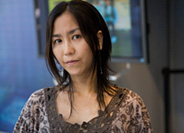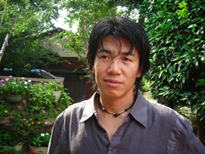Reiko Tahara –co-director/script/edit
 It took us 9 years to make this film. In the meantime, we raised our child, moved twice, struggled to maintain a family life in New York City, and Max lost his beloved mother. To be making a film while living was a challenge, and a hope for us. We learned our limitations, but focused on our possibilities. Now our girl keeps growing strong and gentle in Brooklyn, we feel content about our modest life, and this film contains essence of our first decade as a family. As I was shaken from being in a tiny boat with Max for years trying to cross the big Pacific Ocean between our two homes, and probably as I touched Buddhist thinking through Teijun’s life, my young dream of making it as an independent filmmaker grew a bit wiser. I now feel more humble yet passionate about the role of a filmmaker as a storyteller in our community. It is my sincere wish that I can make myself useful by doing what I can and love doing.
It took us 9 years to make this film. In the meantime, we raised our child, moved twice, struggled to maintain a family life in New York City, and Max lost his beloved mother. To be making a film while living was a challenge, and a hope for us. We learned our limitations, but focused on our possibilities. Now our girl keeps growing strong and gentle in Brooklyn, we feel content about our modest life, and this film contains essence of our first decade as a family. As I was shaken from being in a tiny boat with Max for years trying to cross the big Pacific Ocean between our two homes, and probably as I touched Buddhist thinking through Teijun’s life, my young dream of making it as an independent filmmaker grew a bit wiser. I now feel more humble yet passionate about the role of a filmmaker as a storyteller in our community. It is my sincere wish that I can make myself useful by doing what I can and love doing.
In our filmmaking, our Japanese identities and our painfully (and joyfully) “real” life in Brooklyn often build the base of our work. Then it expands. Max’s interest in sound and music, my curiosity in the issues of woman, religion, or family, and our common fascination for history give more layers. Max’s musical esthetics and my visual/ story sense in documentary give the framework for our thoughts and feelings. We take many layers in one film as a good challenge, hoping that the sparks and tensions among the media elements we create would transmit a strong experience to the viewers. It may not be an easy film to watch because of its uncompromising length and complexity, but we believe that it has a power to shake viewers’ minds and stay with them for a long time, hopefully giving them a chance to reflect on their own journeys toward their own happiness.
Our first attempt was to make a straightforward mini-portrait of Teijun for Western television. But I ended up looking for her imprisoned feelings after her death and turn the film into a non-traditional detective documentary. In retrospect, this film could be made because she was gone, since she wouldn’t have allowed us to dig into her womanhood in her earthy presence. Strangely enough, though, I feel that it was her who drove us to make the film the way it is.
Max Uesugi –co-director/original Music/sound design
 After our second shooting trip to Japan, I began developing several musical themes, along with the entire film’s structure. My initial musical ideas for this film though had already come to me while I was shooting, listening to the amazing chanting.
After our second shooting trip to Japan, I began developing several musical themes, along with the entire film’s structure. My initial musical ideas for this film though had already come to me while I was shooting, listening to the amazing chanting.
Before this film, I composed music for other people’s movies. For this one, I was the composer as well as co-director and cinematographer, and I wanted my on-location feelings reflected in the music – turning my firsthand experience into musical notes that expressed what I felt at the location more so than what I felt in front of the monitor after viewing the rough cut. This idea seemed beautiful to me.
But there was one difficulty I didn’t see coming—and this occurred quite often: the composer (myself) had to seek editorial changes from the editor (Reiko) and eventually approval from the co-directors (Reiko & me), in order to accomplish the composer’s goals. This scenario is unusual and rarely, if ever, happens in the conventional hierarchy of any given post-production environment, which is ironically why I do want to compose on our own film. Because of that upside-down authority, the composer was able to map out his storytelling, although it took a long long time to come to an agreement with the partner(s) each time (Sometimes, anagreement was never reached).
In this way, I constellated several musical themes, together and separately, throughout the film: Teijun; MRex (Reiko and Max); Buddhism; parenthood; and so on. Yet, from the beginning, I believed that the very core music of this film already existed before my music. Chanting. Variety of chanting. So the music that I made was only to serve my way of storytelling – weaving it into the voiceover or the dialogs. My hope is that by tracing of each particular theme, sometimes in a different tempo and color, audience would enjoy our parallel sonic storytelling, Reiko’s linguistic and my music storytelling. You might discover something new, should you listen carefully to the film a second time.
Certainly, The GateKeepr of Enmyoin is about the protagonist, Teijun, her young heiress, and their Buddhist environment. But the film exists through the eyes of MRex, whose perspectives, while originally shaped in Japan, have been nurtured in New York. The film is not made in Japan or made by non-Japanese. It is made by Japanese who have a life outside of Japan. After all, this film hopes to be seen and heard beyond one culturally dominant perspective.